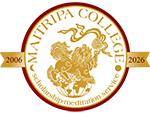Insights and Foundations: Buddhist Chaplaincy Training in the Pandemic
A Story from Maitripa College Students
Kate and Jane each planned to complete a unit of Clinical Pastoral Education (CPE) as interns the summer before their final year in the MDiv program at Maitripa College. They wrote and rewrote application essays in September and October of 2019 in one of their classes with me. In the winter of that year, after what felt like a long wait, they were invited for interviews. Then came the exciting news that they had been offered admissions. Kate planned to enroll at Legacy Emanuel Medical Center, and Jane accepted an offer from the Portland Veterans Administration (VA) hospital.
A few months later, the city was on novel coronavirus pandemic lockdown.
COVID-19 was new and scary. The way the virus was transmitted was unclear, and protection methods were speculative and in short supply. Across the country, loved ones were dying in makeshift hospital units without visitors, former health care providers among them. There were so many unknowns: would CPE programs continue? Would it be safer for these students to defer their learning in CPE to another summer? Wasn’t the need for Spiritual Care now greater than ever?
As their academic advisor, initially I felt that I could not in good conscience continue to recommend that Jane and Kate take CPE under these conditions, despite having been a strong advocate of the professional and clinical training since they entered our graduate educational program. An internship in spiritual care isn’t meant to be potentially life-threatening. I needed to know that they would be protected as students, and of course, they were concerned about not endangering their own families and communities. And yet, Jane and Kate remained highly motivated to learn, to grow, and to serve.
During this time, we talked to CPE clinical educators at various local hospitals and, after the initial spring months of uncertainty, a reassuring picture emerged. We became convinced that adjustments to the pandemic had been successfully implemented for spiritual care department personnel for the summer to come. Kate and Jane decided to go ahead. Their CPE experience would include learning alongside their instructors, clinical partners, and spiritual care department colleagues who were also learning new skills, such as like donning PPE (personal protection equipment) and tele health/phone technologies. What spiritual care interventions would work, and how, no one yet knew.
Their experiences of CPE during the pandemic differed in terms of the structures of their programs. Legacy continued to operate almost entirely in-person, while the VA CPE went almost entirely virtual, but both Kate and Jane discovered powerful insights into their own spiritual care practice and found strength in the foundation of Buddhist education supporting them. Despite everything, a rich learning experience unfolded for them both, highlighting the important role of their Buddhist practice and their studies at Maitripa College in navigating this new clinical setting.
Kate’s experience at Legacy Emmanuel Medical Center
Kate was a chaplain intern at Legacy Emmanuel Medical Center, a Level One trauma center with a diverse population. In this experience, Kate was exposed to patients who experienced a wide variety of causes leading to hospital admission. Despite the pandemic, all of her spiritual care visits and cohort classes were conducted in person, although her weekly supervisor meetings were done via Zoom.
What stood out as unique about doing CPE during COVID for Kate? “I will never forget the sight of the big black screens they put up around COVID zones in the hospital. Nor will I forget the look in a family member’s eyes as we prayed over his dying mother, who was no longer COVID positive but was dying of Acute Respiratory Distress Syndrome (ARDS) from COVID. And the tension and fear around the virus was notable [among staff, too],” she told me.
Prior to CPE, Kate had been curious about how to skillfully work with people from different religious backgrounds. She was also curious about how she might care for herself, as a highly empathetic person, after being deeply immersed in others’ suffering day after day.
As the summer progressed, Kate began to notice that in the midst of caregiving, others’ religious backgrounds and “differences” were not the challenge she anticipated.
She said, “I am really grateful. I felt really prepared for doing what the patient wants. We serve; the default isn’t ‘us’ and ‘our’ own religious perspectives. I think [other members of] my cohort found this harder, but for me, as a Buddhist, I’m always ‘outside my faith’ in encounters with others. I noticed that the rest of the cohort leaned on their familiarity with Christian traditions in such a way that made it harder for them to relate to individuals as unique.”
Kate laughed that her CPE program members complimentarily saw her as “so Zen,” as she sees herself as someone with a “long way to go in developing pastoral authority.”
She and her cohort had many opportunities to practice and reflect on their pastoral authority during her internship: “On my first night, I was asked to do communion (something I have never even received). Another member of my cohort was asked to baptize a dead baby. Another was asked to accompany a family as they walked their loved one to organ donation. We were all regularly the only Chaplain on duty in the whole hospital, and all had to learn to use pastoral authority as Chaplains.” It sounded daunting, and they were forced to learn to make the world of the hospital, and each patient room, a site of learning outside the classroom. “But,” Kate concluded at the end of the summer, “such is the life of a Chaplain intern at Legacy! You have to be ready for anything.”
Kate held a hospice chaplaincy career goal from the moment she applied to Maitripa College. After “loving CPE” she reflected, “I’m less attached to hospice now, but definitely I am certain that chaplaincy is what I want to be doing. The hospital setting diversified my interests. I found that it was easy for me to work with the very marginalized.”
I asked Kate to tell me a story about one of the biggest challenges of her work last summer. She recalled that she had spent one night supporting a mother admitted through the Emergency Room, along with her child, both of them injured as a result of their car being involved in a late-night drunk driving accident. Only after leaving the hospital after her shift, and driving home to her own children, did it really sink in for Kate that the mother herself had been the drunk driver. She was surprised to realize that judgmental thoughts that she might have expected to arise—about someone with a substance abuse disorder endangering lives including that of their own child—simply were not present during her visitation with the patient. Asked about secondary trauma or difficulty with such experiences after the fact, Kate said she had been well supported by the program and her own self-care rituals to transition back into home life after hospital shifts. However, she joked that she had been shocked to see just “how dangerous a place the world is! I had no idea that kids fall out of windows, but they do, and apparently fairly regularly, judging from regular E.D. (Emergency Department) admissions! And people get really hurt falling down stairs! Now I notice at home that I hold the handrail tightly!”
One of Kate’s biggest learnings about herself was that she did not fall prey to “empathetic distress.” While she “expected” that this might be an issue, her internship led her to discover a strength and grounding that she didn’t know she had.
Jane’s Experience at the Veterans Affairs Medical Center
Jane chose to go to the Veterans Affairs Medical Center (VA) to complete her CPE unit. The population was not diverse, as the large majority of inpatients (Veterans) were white, male, and in their fifties or older. Jane remarked how noticeable the absence of female patients was to her, though there were women in the Spiritual Care Department and CPE program.
In her CPE program, Jane says that she “never did have any face-to-face contact with patients or their families. It was all over the phone. So that was the biggest effect of COVID on my internship. As a result, the real intimacy that went on throughout the internship was among my cohort (which was also not in person), and that was probably the biggest learning source for me: how others come to spiritual care as a result of family of origin, religious background, and personality. My favorite part was the interfaith aspect of the cohort.”
Prior to CPE, Jane had identified a wish to understand better and skillfully relate to those who held very different views—particularly political and religious views—than her own, which was in part related to her own family of origin challenges. Jane also has analytic strengths and curiosity about the mind, and wondered how short-term spiritual care, let alone a single visit in the absence of time for lengthy conversations and relationship building, might work at all.
Jane discovered that the Interfaith setting of CPE helped her reflect on her Buddhist practice and views:
“I really learned about how paying heed to mind [as in Buddhism] lends itself to a particular way of addressing spiritual care, more focused upon how one can do self-care, rather than leaning upon [God]. I found that this self-reliance was my own filter, and my care tended to point in that direction, whereas a patient might want to instead use their sense of God to lean on someone, or something else. I found this to be my unexamined tendency, and that for some who don’t allow themselves to lean on anyone throughout their lives, calling upon that greater God is a way to find solace in something else, to yield without judgment.”
She discovered, “my Buddhist practice is highly internal, introspective. Chaplaincy is relational. It feels really good to lay myself aside. I think, ‘what do they need?,’ and then enter into that with them.” Jane said, “I had worried about oppositional views [between us], but it turned out not to be a problem. Instead, I got more insight on an emotional level, seeing how [people of other faiths] work.”
A challenge her CPE Clinical Educator helped her to surface and then work on became a breakthrough in Jane’s approach to spiritual care. She identified that she had “hesitated to use what I know and can do, which came from a fear of imposing myself or my religion on another. But actually, it’s the total opposite. They need us to be proactive and can’t, in that difficult moment, invite us to do something, so we invite them. My habit from being a teacher was to explain about an idea or something others might try or do, like describe a breathing meditation. I had to practice with the insight that what really helps is to just do the thing, not talk about it. Breathe together, right there.”
Since completing one unit of CPE in summer 2020, both Jane and Kate returned to Maitripa College to complete their final semesters of the Master of Divinity degree, and applied for and have been accepted to year-long CPE residencies starting in August 2021. Kate will return to Legacy Emanuel, and Jane will be going to a hospital-based CPE residency in California. Congratulations, Jane and Kate!


